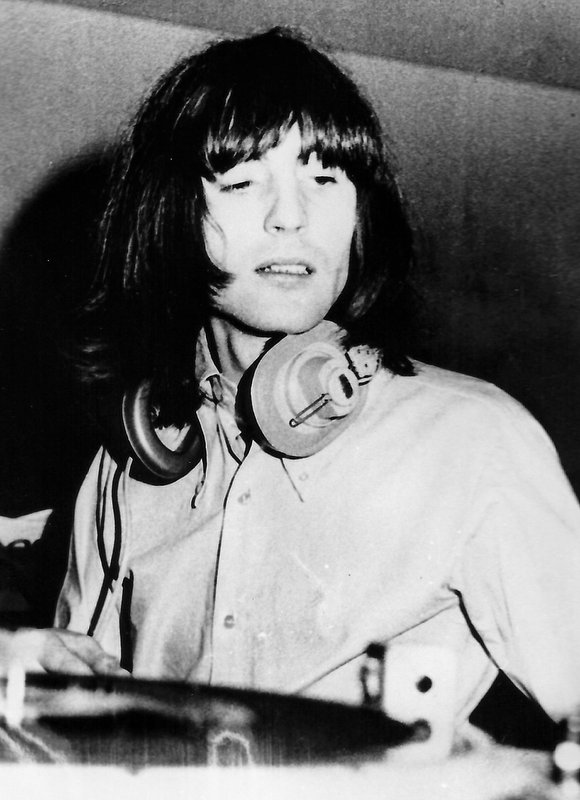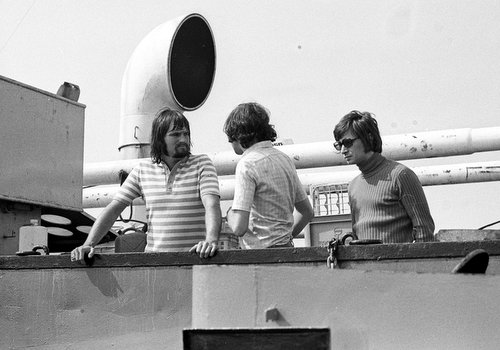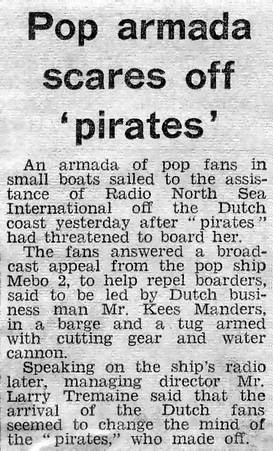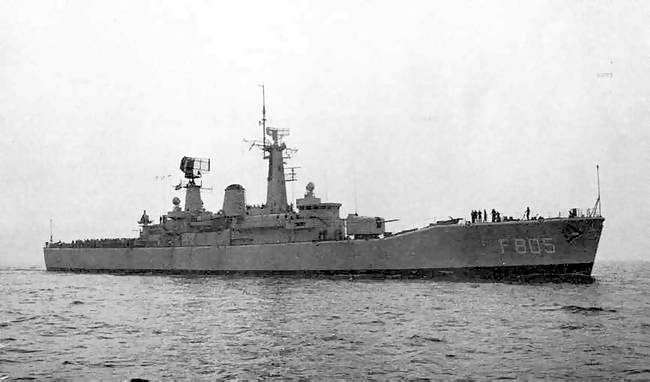Part four: the return to Holland and an attempted hi-jack.
|

|
|
Roger Day. Photo published by the Free Radio Association from the archive of Rob Olthof, kindly donated by Hans Knot.
|
On the day after the General Election, senior DJ Roger Day left the ship to go on holiday. Two weeks later he returned from Spain to find that he no longer had a job. Managing
Director Larry Tremaine had fired him.
Following the British government's jamming of Radio Northsea International, the station owners decided to retreat back to the Dutch coast. On 24th July 1970 RNI resumed transmissions on 1230 kHz,
244 metres medium wave, in the 49 metre short wave band at 6205 kHz and on 102 MHz FM from an anchorage off Scheveningen. The jamming ended but unfortunately the station's troubles were far from over.
RNI's medium wave transmissions were now causing interference to the Dutch national station, Hilversum 3, which operated on 240 metres. Disc-jockey Andy Archer linked up on air with
the Hilversum 3 engineers and told them that RNI was attempting to narrow its bandwidth in an effort to solve this problem. The pirate station's FM signal was also causing problems. It was interfering with the Dutch
bus company's communications. On 31st July RNI closed down to make some changes.
|

|
|
Click on the headline to see how ‘Record Mirror’ reported the planned Dutch service.
|
It returned to the air on 3rd August on 1385 kHz, 217 metres, and 6205 kHz on the 49 metres short wave band. Unfortunately this medium wave frequency suffered from heavy night-time interference from
a Russian station. On 4th August FM transmissions resumed on a new frequency, 96 MHz, and the following day 31 metre short wave broadcasting started too, on 9940 kHz.
|

|
|
Carl Mitchell, Andy Archer and Alan West on the deck of the Mebo II on the afternoon of 29th August 1970. For more photos from the attempted
hijacking of the ship, see Flickr. This photo taken by André Lieberom, kindly provided by Cor Draijer.
|
Around this time plans were announced for a Dutch service to replace the German programmes. On Monday 18th August RNI closed down because of trouble with the transmitter coils. On Wednesday it was
back on short wave and FM (100 MHz), and on Sunday 23rd resumed medium wave transmissions on 1385 kHz. The following day the station moved to a new, clearer, wavelength, 220 metres, 1367 kHz. It also began broadcasting
24 hours a day.
While all this was going on at sea, on land the station's owners, Meister and Bollier, were planning their new Dutch service. It had been an expensive few months for the Swiss duo and to help fund
the new programmes, they invited a Mr. Peter Heerema to invest £50,000 in the station. He, in turn, approached a former Radio Veronica executive, Kees Manders, and asked him to sell airtime. These discussions were
carried out in the utmost secrecy so the two Swiss bosses were furious when Mr Manders announced to the Dutch press that he was now the Commercial Director of RNI's Dutch service. He claimed that he had sold advertising
on behalf of Mebo and was owed £3,000 in commission. Meister and Bollier said that they had no contract with Mr Manders. The matter went to court where the judge found in their favour. Mr. Manders was not employed
by the station. He was none too happy about this decision and decided to take matters into his own hands.
During the afternoon of Saturday 29th August two boats, the Huski and the Viking, both owned by Mr Heerema pulled close to RNI's home, the mv Mebo II. On board Mr Manders and Mr Heerema were accompanied by
about thirty men as well as a woman and child. Mr Manders asked to speak to the captain of the Mebo II and was allowed to board the broadcasting vessel. He claimed that he was now the owner of the Mebo II and wanted to tow
her into harbour. The Captain refused this request and tried to contact his bosses on land via a secret radio link. This did not work because the land station had been seized by the Dutch Post Office (PTT) after an anonymous
tip-off. Similarly the ship's tender, the Mebo I, had been impounded following some information received. The radio ship was effectively cut off and the Mebo II's crew members out-numbered by the many rather large men on the
two boats. The disc-jockeys barricaded themselves in the studio and, in one of the most dramatic afternoon's broadcasting ever, appealed to their listeners for help. They asked them to telephone the station's offices in
Zurich and Scheveningen, which they did in their hundreds, jamming both telephone exchanges. They also appealed for small boats in the vicinity to come to their aid.
At one point the attackers threatenied to dowse the station's antenna with a water cannon. They abandoned this foolish idea when DJ Carl Mitchell warned them that the high voltage would arc back, probably fatally. They then
attempted to cut the Mebo II's anchor chain but, before they could get started, a small boat, The Eurotrip, arrived from shore carrying the shipping agent, one of the owners, Erwin Meister, and the managing director, Larry
Tremaine. As the Eurotrip hurried out to the Mebo II, the attackers turned tail and sailed away. As well as the Eurotrip, other small boats came to offer assistance, including one from their neighbour, the rival station,
Radio Veronica.
Larry Tremaine immediately went onto the air. He thanked all those people who had “lit up the switchboards” at the Grand Hotel (RNI's Scheveningen base) and in Zurich, as well as those who had come out in boats
to help, despite the possible dangers. He emphasised that RNI was “not around to make trouble.... (but) to provide ..... musical entertainment”. He pointed out how the DJs had saved the lives of their aggressors
by stopping them using their water cannon. He reassured the listeners that Mr Manders had no right to the ship. No contract had ever been signed and the recent court hearing had confirmed this. Northsea was doing nothing
wrong and wanted a peaceful life.
After this eventful afternoon, normal programmes resumed with a Dutch naval frigate standing guard and the DJs sounding immensely relieved. The following day Andy Archer hosted a request programme for the sailors on board
the frigate. There was no repeat of the attempted hi-jack and life returned to normal.
 Sunday morning and Andy Archer is playing requests for the sailors on board the naval vessel standing guard on the Mebo II. Recording courtesy of Hans Knot (duration 3 minutes 43 seconds)
Sunday morning and Andy Archer is playing requests for the sailors on board the naval vessel standing guard on the Mebo II. Recording courtesy of Hans Knot (duration 3 minutes 43 seconds)
|
TWO AND A HALF HOURS IN THE LIFE OF RNI
Saturday 29th August 1970
Around 1.35pm two boats approach the mv Mebo II and Kees Manders asks to come aboard.
 Unable to get through on the radio link, Andy Archer interrupts the Spangles Muldoon show at 1.45pm to ask listeners to alert the station bosses to what is going on at sea (duration 4
minutes 41 seconds)
Unable to get through on the radio link, Andy Archer interrupts the Spangles Muldoon show at 1.45pm to ask listeners to alert the station bosses to what is going on at sea (duration 4
minutes 41 seconds)
 It is 2pm, Andy has taken over the show while Spangles, who is also the Station Manager, is needed elsewhere. The hatches are being battened down (duration 2 minutes 57 seconds)
It is 2pm, Andy has taken over the show while Spangles, who is also the Station Manager, is needed elsewhere. The hatches are being battened down (duration 2 minutes 57 seconds)
 2.15pm Carl Mitchell has more details of the two boats which are involved in the raid and Spangles takes over again (duration 3 minutes 17 seconds)
2.15pm Carl Mitchell has more details of the two boats which are involved in the raid and Spangles takes over again (duration 3 minutes 17 seconds)
 2.30pm Michael Lindsay is now behind the mic, the attackers are threatening to cut the anchor chain and tow the Mebo II into land. They also plan to use a water cannon on the station's
broadcast antenna - a potentially lethal course of action (duration 6 minutes 51 seconds)
2.30pm Michael Lindsay is now behind the mic, the attackers are threatening to cut the anchor chain and tow the Mebo II into land. They also plan to use a water cannon on the station's
broadcast antenna - a potentially lethal course of action (duration 6 minutes 51 seconds)
 3pm Carl Mitchell recaps and there is some good news - help has arrived (duration 3 minutes 17 seconds)
3pm Carl Mitchell recaps and there is some good news - help has arrived (duration 3 minutes 17 seconds)
 3.20pm The Managing Director, Larry Tremaine, thanks the listeners for their help (duration 3 minutes 26 seconds)
3.20pm The Managing Director, Larry Tremaine, thanks the listeners for their help (duration 3 minutes 26 seconds)
 4pm A very relieved Carl Mitchell expresses his thanks and accidentally plays a very appropriate record (duration 2 minutes 42 seconds)
4pm A very relieved Carl Mitchell expresses his thanks and accidentally plays a very appropriate record (duration 2 minutes 42 seconds)
Audio provided by The Offshore Radio Archive, Azanorak and The Pirate Radio Hall of Fame's own recordings.
|
|

|
|
Click on the cutting above to see how four papers reported the raid on the Mebo II.
|
|

|
|
The Dutch naval frigate standing guard on the mv Mebo II after the attempted hi-jack. Photo from ‘The RNI-Book’, published by Hit-Publications, Zurich.
|
|

